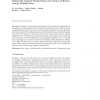168
click to vote
AISS
2010
14 years 11 months ago
2010
Aiming at the task allocation in multi-target tracking of wireless sensor networks, the discrete particle swarm optimization based on nearest-neighbor is presented to reduce the c...
169
click to vote
WOA
2010
14 years 12 months ago
2010
This paper presents an approach for multi-robot coordination based both on coordinated navigation and task allocation method. An ad hoc agent based architecture is defined in order...
126
click to vote
TROB
2002
15 years 1 months ago
2002
Abstract--The key to utilizing the potential of multirobot systems is cooperation. How can we achieve cooperation in systems composed of failure-prone autonomous robots operating i...
140
Voted
AI
1998
Springer
15 years 1 months ago
1998
Springer
Task execution in multi-agent environments may require cooperation among agents. Given a set of agents and a set of tasks which they have to satisfy, we consider situations where ...
137
click to vote
SWARM
2008
SPRINGER
15 years 1 months ago
2008
SPRINGER
We present a biologically inspired approach to the dynamic assignment and reassignment of a homogeneous swarm of robots to multiple locations, which is relevant to applications lik...
130
click to vote
AMC
2007
15 years 2 months ago
2007
In a distributed computing system (DCS), we need to allocate a number of modules to different processors for execution. It is desired to maximize the processor synergism in order...
135
click to vote
AI
2008
Springer
15 years 2 months ago
2008
Springer
We introduce the notion of fault tolerant mechanism design, which extends the standard game theoretic framework of mechanism design to allow for uncertainty about execution. Speci...
101
click to vote
AAMAS
2008
Springer
15 years 2 months ago
2008
Springer
Abstract Multi-agent simulation is applied to explore how different types of task variety cause workgroups to change their task allocation accordingly. We studied two groups, gener...
114
Voted
GECCO
2008
Springer
15 years 3 months ago
2008
Springer
This paper presents a communication-less multi-agent task allocation procedure that allows agents to use past experience to make non-greedy decisions about task assignments. Exper...
139
click to vote
BCEC
1997
15 years 3 months ago
1997
Social insects provide us with a powerful metaphor to create decentralized systems of simple interacting, and often mobile, agents. The emergent collective intelligence of social i...

